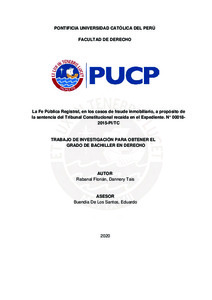| dc.contributor.advisor | Buendía de los Santos, Eduardo Emmanuel | |
| dc.contributor.author | Rabanal Florián, Dannery Tais | |
| dc.date.accessioned | 2021-03-18T13:22:11Z | |
| dc.date.available | 2021-03-18T13:22:11Z | |
| dc.date.created | 2020 | |
| dc.date.issued | 2021-03-18 | |
| dc.identifier.uri | http://hdl.handle.net/20.500.12404/18626 | |
| dc.description.abstract | Uno de los mayores problemas de seguridad jurídica de la primera década del siglo
XXI fue el ocasionado por el fraude inmobiliario, cuyo fenómeno significó la pérdida
del patrimonio de innumerables propietarios peruanos. A raíz de la judicialización de
estos ilícitos, se visibilizó la precariedad de los procedimientos de verificación
documental de los registros públicos y de los funcionarios involucrados en las
transferencias de los inmuebles. Asimismo, quedó manifiesta la diversidad de criterio
judicial en la resolución de estos casos pues, en ocasiones, restituían el inmueble a
los propietarios y, en otras, se la otorgaban al llamado tercero registral. Bajo este
marco, el poder legislativo emite la Ley N° 30313 - Ley de Oposición al Procedimiento
de Inscripción Registral en Trámite y Cancelación del Asiento Registral por
Suplantación de Identidad o Falsificación de Documentación y Modificatoria de los
Artículos 2013 y 2014 del Código Civil y de los Artículos 4 y 55 y la Quinta y Sexta
Disposiciones Complementarias Transitorias y Finales del Decreto Legislativo 1049 -
, cuya constitucionalidad fue, acertadamente, cuestionada y, recientemente, resuelta
por el Tribunal Constitucional, a nuestro criterio, de forma errónea. Tal disposición
normativa otorga protección al tercero registral, antes que al propietario, en los casos
de Suplantación de Identidad y Falsificación Documental en aplicación del principio
de fe pública registral. Dicho criterio ha sido avalado por el Tribunal Constitucional en
la sentencia recaída en el expediente N° 00018-2015-PI/TC a pesar de que el acto
origina la titularidad del tercero es un ilícito. Por ello, en la presente investigación de
orden dogmático documental, pretendemos delinear los argumentos históricos,
lógicos y normativos que sustentan que, ante el fraude inmobiliario, no se debe aplicar
el principio de fe pública registral. Su aplicación se configuraría como un incentivo a
la comisión de delitos que atentan contra la fe pública y contravendría normas de
carácter público. | es_ES |
| dc.description.abstract | One of the biggest legal security problems of the first decade of the 21st century was
caused by real estate fraud, the phenomenon of which meant the loss of the assets of
countless Peruvian owners. As a result of the prosecution of these crimes, the
precariousness of the documentary verification procedures of the public registers and
the officials involved in the transfers of real estate became visible. Likewise, the
diversity of judging criteria in the resolution of these cases was evident since, on
occasions, they returned the property to the owners and, on others, they granted it to
the so-called third-party registry. Under this framework, the legislative power issues
Law No. 30313 - Law of Opposition to the Registration Procedure in Process and
Cancellation of the Registration Entry for Identity Impersonation or Forgery of
Documentation and Amendment of Articles 2013 and 2014 of the Civil Code and
Articles 4 and 55 and the Fifth and Sixth Complementary Transitory and Final
Provisions of Legislative Decree 1049 - whose constitutionality was rightly questioned
and, recently, wrongly resolved by the Constitutional Court, in our opinion. Such
normative provision grants protection to the third party registry, before the owner, in
cases of Identity Impersonation and Document Falsification in the application of the
principle of registry public faith. Said criterion has been endorsed by the Constitutional
Court in the sentence passed in the file N ° 00018-2015-PI / TC although the act
originates the ownership of the third party is illegal. Therefore, in this research of a
dogmatic documentary order, we intend to outline the historical, logical, and normative
arguments that sustain that, in the face of real estate fraud, the principle of public
registry faith should not be applied. Its application would be configured as an incentive
to the commission of crimes that violate the public faith and would contravene public
regulations. | es_ES |
| dc.language.iso | spa | es_ES |
| dc.publisher | Pontificia Universidad Católica del Perú | es_ES |
| dc.rights | info:eu-repo/semantics/openAccess | es_ES |
| dc.rights.uri | http://creativecommons.org/licenses/by-nc-nd/2.5/pe/ | * |
| dc.subject | Derecho registral--Perú | es_ES |
| dc.subject | Derecho registral--Jurisprudencia--Perú | es_ES |
| dc.subject | Buena fe (Derecho) | es_ES |
| dc.title | La Fe Pública Registral, en los casos de fraude inmobiliario, a propósito de la sentencia del Tribunal Constitucional recaída en el Expediente. N° 00018- 2015-PI/TC | es_ES |
| dc.type | info:eu-repo/semantics/bachelorThesis | es_ES |
| thesis.degree.name | Bachiller en Derecho | es_ES |
| thesis.degree.level | Bachillerato | es_ES |
| thesis.degree.grantor | Pontificia Universidad Católica del Perú. Facultad de Derecho. | es_ES |
| thesis.degree.discipline | Derecho | es_ES |
| renati.advisor.dni | 41864065 | |
| renati.advisor.orcid | https://orcid.org/0000-0001-8468-0653 | es_ES |
| renati.author.dni | 71460050 | |
| renati.discipline | 421016 | es_ES |
| renati.level | https://purl.org/pe-repo/renati/level#bachiller | es_ES |
| renati.type | https://purl.org/pe-repo/renati/type#trabajoDeInvestigacion | es_ES |
| dc.publisher.country | PE | es_ES |
| dc.subject.ocde | http://purl.org/pe-repo/ocde/ford#5.05.01 | es_ES |






